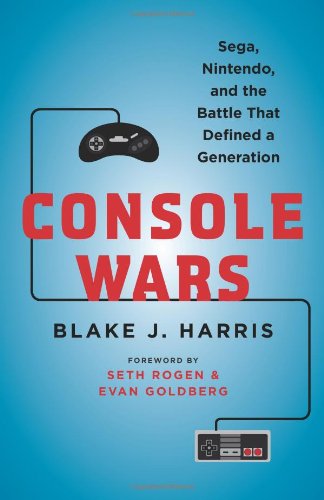At the dawn of the 1990s, Nintendo enjoys virtually
monopolistic control of the video game industry thanks to the success of its
wildly popular 8-bit NES system. Looking to shake up the status quo, competitor
Sega hires former Mattel executive Tom Kalinske to make its new 16-bit system,
the Genesis, a success. Kalinske’s willingness to embrace outside-the-box
thinking and edgy advertising allows Sega to challenge Nintendo’s hegemony. But
as the 90s progress, strained relations between Kalinske’s branch and his
Japanese parent company as well as the debut of Nintendo’s own 16-bit console
turn a quest for relevance into an all-out war.
I became a Genesis owner later in the console’s lifecycle,
several years after Nintendo supposedly won the console war. For that reason,
Blake J. Harris’ blow-by-blow account doesn’t evoke quite the same sense of
nostalgia as it would in other readers. However, it is still irresistibly
interesting, both for its behind-the-scenes trivia and for the snapshot it
provides of early 90s culture.
Readability is Console
Wars’ biggest asset. Though
diligently researched – Harris extensively interviewed several key players at
both Sega and Nintendo – the book is not a dense insiders-only tract. Instead,
it’s structured as a narrative with well-defined characters. There is a
definite new guard-old guard dichotomy between Sega and Nintendo, but neither
Kalinske nor his counterparts at Nintendo (which include former VP and current
Seattle Mariners owner Howard Lincoln) are portrayed one-dimensionally.
Moreover, despite spanning over 500 pages, the book rarely
drags. While it does getting bogged down in marketing minutiae at times, it
sustains its momentum by alternating perspectives, granting pivotal insight
into how each “side” (Sega, Nintendo, and, eventually, Sony) operated. It also
rewards the reader’s patience by bringing to light a wealth of little-known or
long-forgotten lore. For instance, had it not been for his untimely legal
trouble, Michael Jackson would have contributed a soundtrack to a Sonic the
Hedgehog game (!!).
The biggest complaint that can be lodged against Console Wars is that Harris is an uneven
stylist. Some of the reconstructed dialog is hokey and not very enthralling but
convincing for the 40-something executives that were supposed to have uttered
it. In other places, the snark is laid on conspicuously thick.
Perhaps the strongest parallel that Console Wars draws isn’t
to anything in the video game world but rather to Michael Lewis’s Moneyball. Just as you didn’t have to be
a baseball fan to find that book’s narrative, characters, and underlying philosophy
appealing, you don’t have to be a gamer to enjoy this one (though it certainly
helps). And just like Moneyball, Console Wars will be headed to the big
screen (fitting, given that Seth Rogen and Evan Goldberg wrote the hilarious introduction).
Until it gets there, the book will serve anyone who is at least vaguely curious
how a blue hedgehog and a fat plumber came to define a generation.
8.25/10

No comments:
Post a Comment